Reviewed by Glenn Erickson
Some of the best films Criterion chooses to favor are not the acknowledged world classics or even the popular newer art pictures, but overlooked 'mainstream' items that work unusual variations on commercial genre material. We're told that 1959's Bernhard Wicki's The Bridge (Die Brücke) was a daring picture for West Germany. Fifteen years after the war, many of the horrible details of that conflict were not widely known. The Bridge was sufficiently sensational to warrant a spotty American release, and be shown on TV in dubbed form. U.S. viewers had only seen limited film footage of war atrocities. TV docu series like Victory at Sea took a vindictive tone against our former enemies. Nobody talked about the 'marginal unpleasantness' of war so many of us '50s kids were sheltered against. The idea of children being forced into combat was just as shocking as the idea that soldiers might rape civilian women. Do things like that really happen? Our parents didn't answer, but gave us Vietnam instead.
Sort of an update of All Quiet on the Western Front, The Bridge is about German teenagers pressed into combat in 1945 Germany, when the Americans were pouring in from the West. The Russians are almost at Berlin, the war is lost, but the obedient population is ignorant of the full situation. When the onslaught arrives, it scythes through German provinces previously untouched by combat.
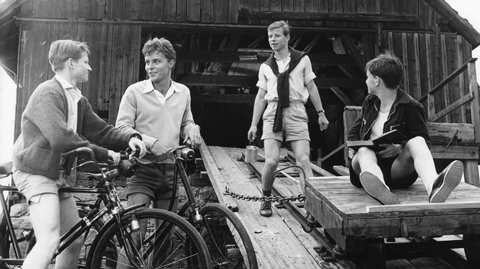
In one small town six or seven 16 year-olds receive their draft papers. Their teacher asks the commandant why they can't be spared, as the war will be over before the boys can be trained to fight. His 'defeatist' talk is ignored. The boys come from a cross section of society. The son of a barber has a crush on his father's employee, a beautician. A washerwoman would like her boy to run away to stay with relatives. One of the boys is carrying on an affair with the school's sexy lady gym teacher, while another is just beginning a chaste romance with a sweet classmate. The town aristocrat berates her neighbors for defeatist talk. She is seemingly eager to send her son to fight, to follow her dead husband. And the son of a Party official is outraged that his father has sent away his mother, so he'll be free to flee East with his secretary. The town has its own garrison. On their very first day in the barracks, a distress call comes in: the Allies are approaching. At the last minute, the local commandant tells the Commanding Officer that he has a number of untrained and unreliable recruits that would be better off left behind. The C.O. gives permission for the boys to 'guard' an insignificant local bridge, while the battalion moves to where the real fighting is expected. Fresh out of short pants, the boys man their positions as if playing a game -- their old tree house becomes the logical lookout post. By a bad turn of events, the little platoon is manning the bridge when an American tank spearhead is sighted. A demolition team arrives, with the intention of blowing up the little bridge, but can't do so because the untrained kids take their orders seriously and block the American advance. A full-on firefight begins.
The Bridge is neatly constructed, with a full hour devoted to establishing the fact that our heroes are a normal group of German kids, none of whom know how badly the war is going and all of whom want to defend their country. The irony is of course that these amateur kids go up against the Americans, even though nobody meant them to be sacrificed in that way. Nothing stands in the way of their being mowed down like cannon fodder.
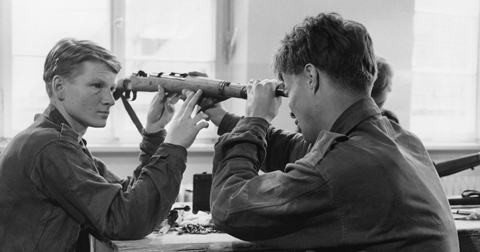
The film is a commercial product, unlike many combat films we've seen from East Germany, that tend to stress a political agenda yet generally avoid crowd-pleasing sentimentality. The Bridge is fairly realistic yet not as honest as it would seem. Its details are optimized to produce a feel-good show for the West German movie-going public of 1959. I shall elaborate.
Author Manfred Gregor (aka Gregor Dorfmeister) wrote the source book from his personal experience. He was a minimally trained recruit just like the boys in the movie. His group stopped a tank, and Manfred was traumatized by the sight of a burning American GI (see Fury and tell your children to stay away from tank duty). Assigned to guard a bridge he knew could not be held for a minute, Manfred instead abandoned his post and went home to bed. When he came back in the morning the Americans had swept through and his comrades were dead.
Where have all the Nazis gone, long time passing?
The Bridge puts a specific social and political spin on everything. In 1945, after five years of catastrophic losses, the rural Germans don't seem to have a clue as to what's going on beyond their rationing troubles. There is no Nazi presence, nor any fanatic SS presence, even though many of the final defenders of the Heimat were elite troops. Everything is falling apart, yet the local battalion musters a good-sized normal force. Nobody looks unduly panicked, although military police are shown looking for deserters.
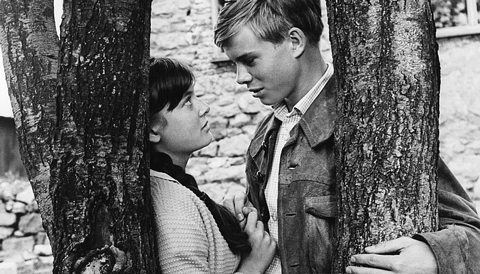
A Hot time in Bavaria.
I want to be a teenager in this town. We aren't told it's due to the lack of adult males, but one of the boys has a good thing going in the gymnasium shower room, short pants or no. The nicest kid has a girlfriend who will clearly do anything for him, although he's too chaste to make suggestions. Two parents are having affairs. We're offered a flash or two of nudity... the producers are clearly interested in having as wide an appeal as possible. And these are clean German boys. Two of them express a keen interest in washing with good soap.
Nothing wrong with this army.
The movie is all sad and heartbroken about children in war, the cruel irony, etc., but it has no real criticism to level at an army that calls up underage boys to fight. We realize that the child troops defending Berlin in the final weeks (which in the timetable should already have begun) were almost absurdly young, and chosen because many were fanatic Hitler Youth -- they could man a cannon almost as well as adults. Yet in The Bridge, the boys end up in the fight by accident. The reasonably benevolent commandant gets permission for them to stay clear of the battle zone, a decent gesture that goes wrong when the Sgt. assigned to babysit them is wrongly detained. So the movie is not about the cruelty of the army, but an 'unfortunate' mistake. Fifteen years after the end of the war, it makes sense that the filmmakers would not want to alienate their audience by criticizing the army, 'dissing' the home team. 1
You've got The Right Stuff, Junge.
In The Bridge our teen soldiers aren't even trained, which we are told was a screenwriting adjustment so that the story of their civilian lives wouldn't have to be told in flashbacks. The boys are dropping a mouse down a girl's blouse one day, and tough fighters the next. Although we're shown that the boys barely know how to clean their rifles, without training they suddenly know how to use all the battlefield weapons, including machine guns and bazooka anti-tank rockets. Although a couple of the kids flip out during combat, the majority hangs in there like Steve McQueen. The aristocrat teen nails a couple of Americans, and smiles in satisfaction; it's the only scene of that kind I've seen until Quentin Tarantino's Inglorious Basterds. The battle scenes are excellent, with the same limitations seen in Robert Aldrich's "attack." The action is exciting and even more realistic than in the American movie. 2
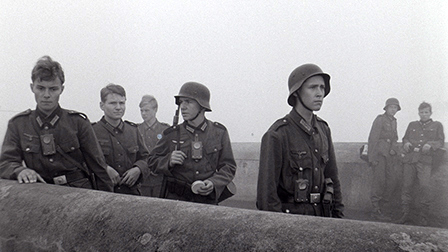
Partial Spoilers: Only one boy is ignominiously gunned down; the rest defend the bridge with a spirit that would have Adolf jumping for joy. Where's the anti-war sentiment? These boys win. The Yanks give up and take their parade elsewhere. Unlike what happened to the original author, the sole wunderkind leaves the field traumatized. He's wounded in the arm, but unaccountably uses that arm to drag his friend a few yards. This is the opposite of anything Erich Maria Remarque would write. It's practically a recruiting poster - hopeless battles are a good way for young Germans to prove their manhood. It fulfills a young boy's fantasies to the hilt. I didn't see this at age ten, but I'd have come out of it wanting to fight with my buddies too.
I'll show you Kindergarten...
The two 'pacifist' touches in combat go nowhere. An American Captain witnesses one of the kids (one of the least aggressive, of course) knock out two tanks, at the same time managing to burn up a German civilian with the counterblast from his bazooka. The Yank acts like an idiot, stepping out in plain view and pleading for them to give up like nice boys, because all the sensible Krauts are retreating (even a tough-looking officer). It's silly. The only word the freckle-faced instant ace machine gunner recognizes is Kindergarten, and his reaction is predictable: "How dare you call me a kid -- eat lead." The other nod to irony is and end card telling us that this real 'incident' was too minor to be reported in the war record. What we see looks so impressive that Eisenhower would be giving the survivor a medal, and sending him straight to West Point. Audie Murphy could use some pointers from these one-day wonders.
The sharply directed The Bridge is still plenty tense. It's fascinating to see combat film conceived from a German POV, even if that POV has been vetted for political correctness. No American is shown callously blowing away a kid, as became a cliché after Ben Gazzara mowed down an ace 12 year-old sniper in The Bridge at Remagen. There is a stab at real madness at the finale, when the kids turn against an abusive German officer. He also underestimates what bloody combat will do to ordinary boys. Where's the sequel, in which the last kid becomes a resistance Werwolf?
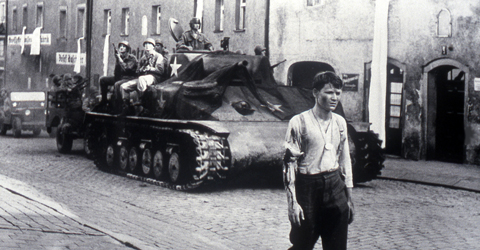
The acting, and Wicki's directing of his youthful players, is excellent. Several of the leads were acting in their first movie, and Wicki gets an open-faced freshness from all of them. I recognize nobody 'international' in the film, which actually helps -- it would not do to have Curt Jurgens or Claus Kinski in there to throw things off balance. The Bridge is basically a special interest war movie -- it was remade in 2008 -- but is also a great show for examining how a film about combat is interpreted by a particular country at a particular time.
The Criterion Collection's Blu-ray of The Bridge is the expected nigh-perfect HD transfer, a 2K scan with uncompressed sound. The B&W image has no flaws; it's a handsomely shot feature in every respect, from the foggy night scene on the bridge through the impressively filmed battle. Only the German language version is present, which is kopasetic with Savant but may irk U.S. viewers who remember the film with re-dubbed English voices. The voice cast included Buck Henry, if the IMDB is to be trusted.
There is a formatting issue, which for Savant shows that Criterion doesn't hold all of its films to the same... criteria. The 1959 film was clearly shot for the 1:66 widescreen format, as can be seen by the text blocks in the main titles, as well as the wide open spaces in the lower part of the frame. I wouldn't call it the formatting crime of the century, but it is off the mark. For purists or the curious, the show will blow up just fine with a TV or Blu-ray player that allows for that. The only problem is that one can only go so far before the subtitles will be cropped away. With less extraneous image to scan in each cut, the action and dramatics are more focused.
The extras give us special insight into the filming. Director Bernhard Wicki appears in an uncritical 1989 interview, explaining the show from his POV. He was probably better known in Germany as an actor (Death Watch) and is glib-nostalgic about the movie that earned him a short but honorable Hollywood career. The German sections he directed in The Longest Day are that film's best by far.
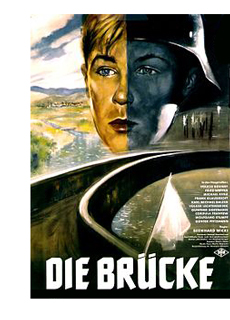
Disc producer Issa Club gives us two new interviews. Author Gregor Dorfmeister offers his own story in a modest piece. He suggests that his own experience was much less glorious than the film version. But he likes the film adaptation and praises the frightening sound effects for the unseen approaching American tanks. Dorfmeister/Gregor also wrote the novel that became the basis for the Kirk Douglas drama Town Without Pity, a much more disillusioned post-war story about a rape by U.S. troops and the misery it visits on a small German town much like the one pictured in The Bridge. I hope a Blu comes along soon of that one too.
Another new interview gives us a few privileged minutes with director Volker Schlöndorff, who diplomatically skirts the fact that the next wave of young German directors were in basic Godard/Truffaut-style revolt against the old guard, to which Wicki belongs. Schlöndorff was just getting going at the time. His 1966 Der Junge Törless takes a completely opposite view of German schoolboys, as sadistic little conformists. To each his own.
A final piece is a segment of a 2007 docu by Wicki's widow, that doesn't offer much information but does have some interesting BTS footage, and shots of a modern bridge that presumably replaced the old concrete one seen in the film. Turning back to the formatting issue, clips from The Bridge are interpolated, cropped to 1:78. They look somewhat overscanned but fairly well prove that a standard 1:66 scan would have been appropriate.
A unique action film, The Bridge will certainly attract fans of combat pictures. Unnecessary personal epilogue: back in 1963 or so it was the talk of the playground in the 4th grade. But I missed those TV broadcasts and have been waiting to see it ever since. I wanted to see the scene in which, as described by a classmate, "the guy got his face burned off by the rocket. It was, like, gross."
On a scale of Excellent, Good, Fair, and Poor,
The Bridge Blu-ray
rates:
Movie: Very Good
Video: Excellent with formatting issues
Sound: Excellent
Supplements: New interview with book author Gregor Dorfmeister, new interview with filmmaker Volker Schlöndorff; 1989 TV interview with director Bernhard Wicki; excerpt from a 2007 documentary by Elisabeth Wicki-Endriss, Wicki's widow. Folding insert essay by film critic Terrence Rafferty.
Deaf and Hearing-impaired Friendly?
YES; Subtitles: English
Packaging: Keep case
Reviewed: June 1, 2015
Footnotes:
1. This is natural. Have you seen many successful, popular movies that criticize potential incompetence, mismanagement, cruelty or absurd folly / barbarism in any of our wars of the last 25 years? I can think of only one, Three Kings. I'm pretty sure it was a hit.
Return
2. Neither film received the military cooperation granted films with recruitment potential. The resident American forces in West Germany wouldn't cooperate with a movie about Yanks killing kids, any more than the Army back in Hollywood would supply resources for Aldrich's movie about corruption in the chain of command, and the fragging of an officer. Aldrich had to make due with fairly pitiful rental 'tanks' that look like modified tractors. Berhnard Wicki's propmen and fabricators came up with inauthentic yet serviceable fake tanks built atop trucks. They're somewhat misshapen and their cannon don't fire particularly impressively. As everyone points out, the truck tires are visible underneath, like the tennis shoes under the mock-up crabs in Attack of the Crab Monsters. In this Hi-def scan we can see that only one tank had operating treads. The second in line is like a parade float, with treads that hover about a foot in the air. Wicki's framing and editing minimizes the problem, and the sequence is very good.
Return

Text © Copyright 2015 Glenn Erickson
See more exclusive reviews on the Savant Main Page.
The version of this review on the Savant main site has additional images, footnotes and credits information, and may be updated and annotated with reader input and graphics.
Return to Top of Page
|

